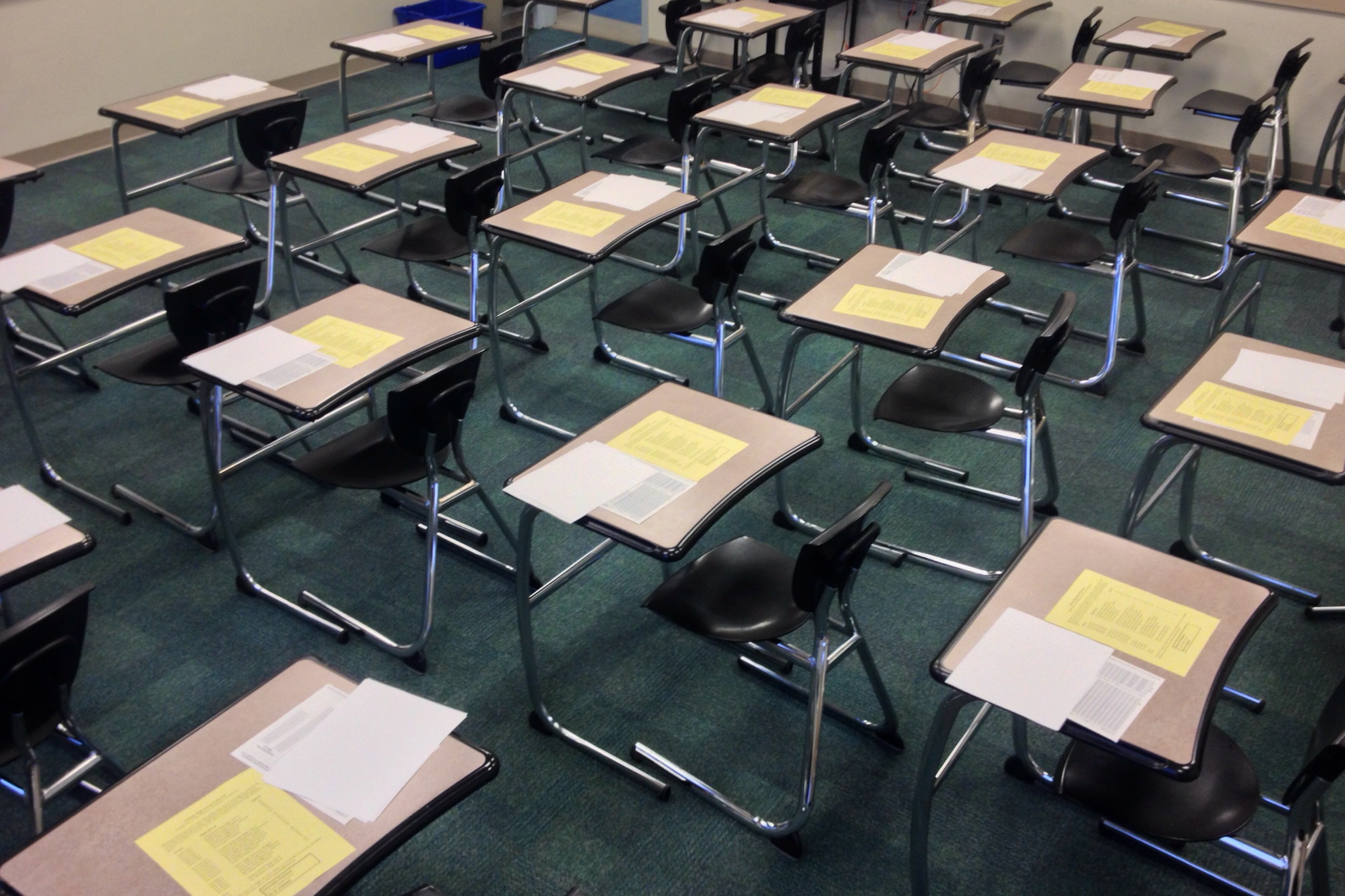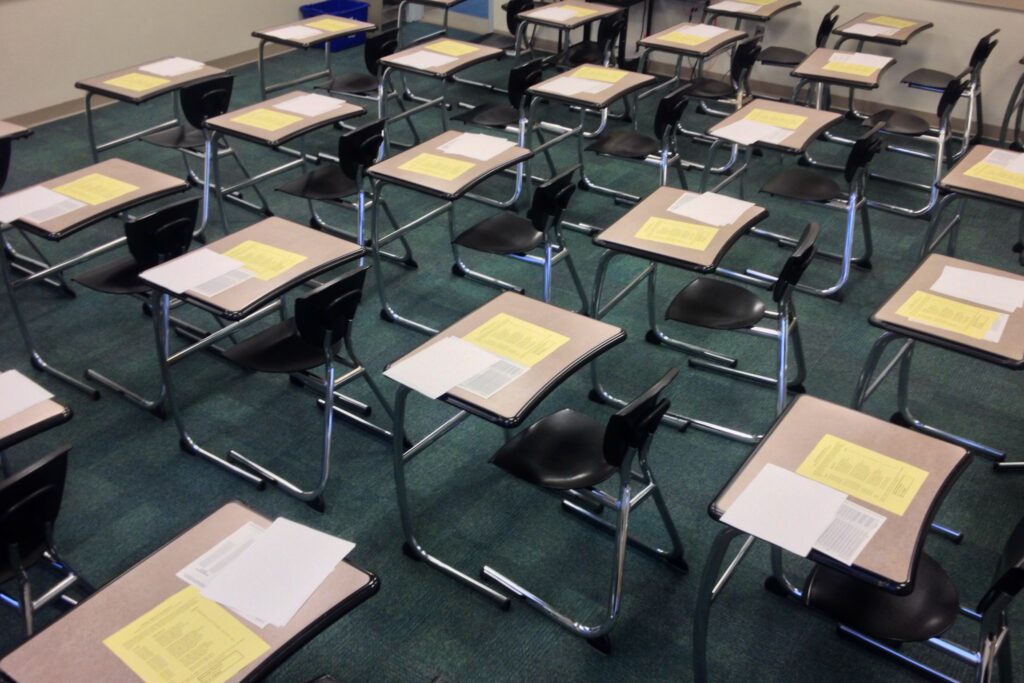Originally Authored at TheFederalist.com

Despite working as an AP exam scorer for nearly 10 years and an AP Language and Composition teacher for nearly 20, I’ve always struggled with properly classifying the entity that is formerly known as The College Board.
Technically, College Board is a nonprofit company that designs college-level courses and exams for high schoolers who want to earn college credit. This is meant to be a resource for all schools, particularly ones in low-income areas, that could save time and money for students who might not earn a college degree otherwise. Put another way, Advanced Placement is about making the mostly fabricated plot of the classic ‘80s film “Stand and Deliver” a reality for millions of American students.
However, as the Goldwater Institute lays out in a new comprehensive report, almost all of this is wrong. In reality, College Board is “a taxpayer-funded monopoly that dictates the curriculum for millions of American schoolchildren.” Each year, the company rakes in “over $1 billion in revenue and [pays] its CEO a compensation package of over $2 million a year — nearly 30 times the median high school teacher’s salary.”
And in my experience, their customers are not working-class children trying to move up in the world, but affluent kids at wealthier school districts who take the AP classes and exams as a matter of course. In most cases, poorer students in run-down campuses lack both the money for the exam (which cost $100 each) and decent enough instructors to prepare them for it (the College Board training programs are largely a joke). Thus, in the end, AP mainly caters to upper-middle-class white and Asian students simply doing standard college prep.
To make up for this, College Board’s leadership and curriculum writers have adopted an overtly progressive stance — the very epitome of sh**lib hypocrisy. As the report notes, “The chairman of the College Board’s governing board has declared ‘anti-racism’ as his ‘driving ethos;’ he also stated as a district superintendent that all employees ‘must share’ the goals of an ‘equity lens,’ and oversaw the College Board issuing a letter of opposition to the Supreme Court’s decision to end race-based discrimination in college admissions.”
As one might expect, this has translated to certain curricular decisions, particularly with courses like U.S. History and African-American Studies, which “have embraced ideologically driven, politically left-leaning views of their subjects while minimizing the emphasis on more fundamental aspects of history.” In practice, this means pushing certain texts with Marxist slants like Howard Zinn’s A People’s History, and prohibiting more historically accurate books like Wilfred McClay’s Land of Hope.
This leftist sensibility filters into other humanities courses as well. In AP Language and Composition (the most popular AP class by far), I’ve noticed that the recommended texts are always composed of an obviously diverse set of authors who write on leftist topics like identity, race, gender, misinformation in media, and the immigrant experience. The exam has also incorporated more of this subject matter in both the passages for multiple choice section of the exam as well as passages for the rhetorical analysis essay — for reference, the writers featured in recent exams were Sonia Sotomayor, Michelle Obama, Barack Obama (twice), Reshma Suajani (a leftist Indian-American activist), Rita Dove, and Simu Liu (the leftist actor who played Shang-Chi), all of whom spoke about identity.
It should be remembered that assigning and reading one thing usually means not assigning and reading another. So instead of reading classics from the Founding Fathers or great American orators, American students in AP Language and Composition are reading and analyzing irrelevant drivel from leftist New York Times columnists along with Sonya Sotomayor’s dull reminiscences on eating Puerto Rican food. On one hand, this is much easier for students to do, but on the other hand, it’s a sad reflection of how mastery in advanced rhetoric has now degenerated into reading (and sometimes regurgitating) banal leftist pablum and spinning it into something profound.
Even worse than enabling a leftist agenda in its material, The College Board’s monopoly has allowed it to cheap out on its actual product: the AP Exam. As most AP teachers of any subject can attest, nearly all the exams have become easier with fewer questions, fewer answer choices, more time, a simplification of standards overall, and dumbed-down rubrics for essay responses.
In my class, the combination of leftist partisanship and easier exams has the effect of encouraging bad reading and writing. No longer are students required to be concise, clear, organized, and logical in their writing, nor do they need to expand their vocabulary or imagination when reading. Instead, successful students are the ones who can whip up pretentious word clouds filled with the right buzzwords and can consistently read and think at a middle-school level.
Naturally, College Board’s monopoly needs to be broken up for reform to happen. In addition to recommending that states “end their favoritism toward the College Board and the AP program and adopt a policy of neutrality,” the Goldwater Institute also calls for more “transparency of public school syllabi” in regards to AP courses as well as the creation of alternative assessments and college preparation programs (something which I wrote about here). As it stands, the only other advanced curriculum for high school is the International Baccalaureate (IB) program, which is far more expensive than AP and has its own set of challenges since it’s not intended to be implemented at a mass scale.
That said, even if these changes don’t happen, it’s fair to declare that College Board’s supremacy is coming to an end. More campuses across the country now offer dual-credit programs, many of which are tied to vocational tracks, and this continues to siphon students who normally would take AP in high school. As sad as this makes me (dual credit usually amounts to a lower-level education better suited to students who won’t go to a four-year college), the logic is sound: the classes are easier, there’s no exam, the credit is assured, and students can move on with their lives. I’d probably do the same if I were them.
Unfortunately for College Board, no amount of leftist virtue signaling and watering down of content will solve this problem. The supposed nonprofit testing company has grown too big and unwieldy, straying from its original mission of offering college-level instruction to talented students willing to work hard and challenge themselves.
Ultimately, an effective school choice program — which is what the Goldwater Institute and us conservative educators are essentially seeking — is about meeting the educational needs of all students by opening up different pathways to starting a career or going to college. Aside from having money follow students and not mediocre school systems, this means incentivizing schools and curricula that provide a rigorous education for students who can handle it.
Just like the one-size-fits approach doesn’t work for public schools, neither does it work for advanced curricula and exams. The public school and College Board leviathans must both be slain before genuine reform can happen.
